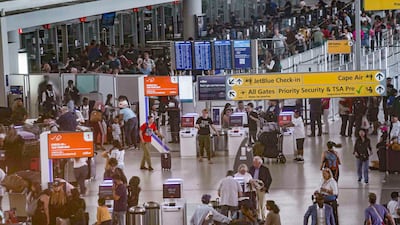Global air traffic recovered in May to 96.1 per cent of its pre-pandemic levels in the same month of 2019, with Middle East airlines leading the rebound, the International Air Transport Association (Iata) HAS said.
Middle East airlines in May fully recovered their international passenger traffic levels, which reached 17.2 per cent above 2019's performance, the industry body said on Thursday in its monthly report.
Routes between the Middle East and other regions have had a surge in traffic, the report showed.
Passenger traffic from Europe to the region rose in May from the previous month. Other thin markets, such as routes between the Middle East and Asia and between Africa and the Middle East, have registered similar trends.
Data on ticket sales also suggested a significant increase in transit and direct traffic in May for the region, according to Iata.
"People need and love to fly. The strong demand for travel is one element supporting a return to profitability by airlines," Willie Walsh, director general of Iata, said in a statement.
Airlines in the Middle East are stepping up operations, boosting workforces and adding capacity to meet the global surge in travel demand that has continued unabated despite inflationary pressures and fears of an economic recession.
Earlier this week, Emirates Group said it was planning a “mammoth” global recruitment drive in aviation roles as it boosts its workforce for its next major growth phase. The Dubai-based international aviation company is seeking to hire cabin crew, pilots, engineers, IT professionals and customer service agents at Emirates airlines and airport services company dnata.
In terms of air cargo, global demand fell 5.2 per cent in May compared to the same month of last year, due to challenging trade conditions worldwide, Iata said.
Cargo capacity rose 14.5 per cent compared to May 2022, mainly driven by belly capacity, which is increasing as passenger travel demand recovers.
Capacity is now 5.9 per cent above May 2019 (pre-pandemic) levels, Iata said.
“Trading conditions for air cargo continue to be challenging ... with several economic indicators pointing towards weakness," Mr Walsh said.
"The second half of the year, however, should bring some improvements. As inflation moderates in many markets, it is widely expected that central bank rate hikes will taper. This should help stimulate economic activity with a positive impact on demand for air cargo."


